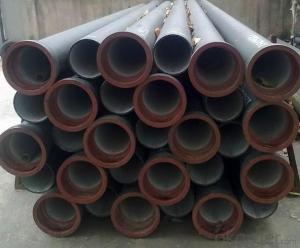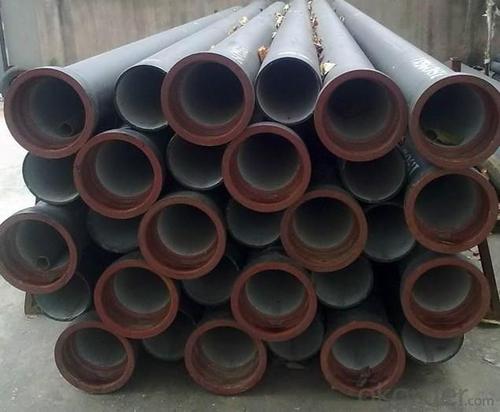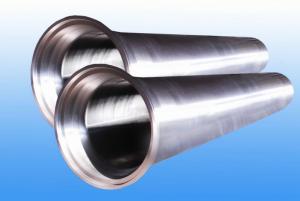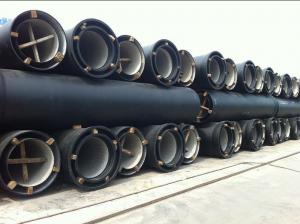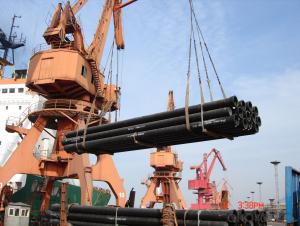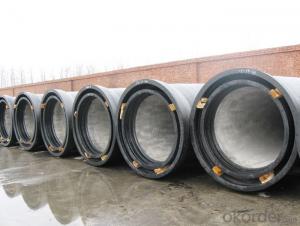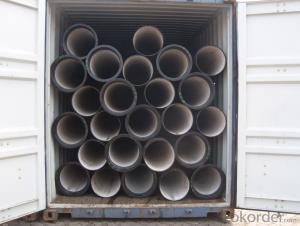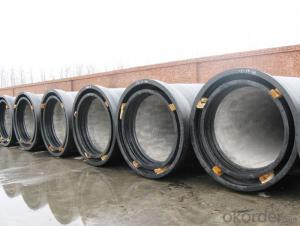Ductile Iron Pipe of China DN300 ISO2531 On Sanitary
- Loading Port:
- China main port
- Payment Terms:
- TT or LC
- Min Order Qty:
- 20 m.t.
- Supply Capability:
- 100000 m.t./month
OKorder Service Pledge
OKorder Financial Service
You Might Also Like
1,Ductile Iron Pipe Description :
DI pipe fittings are manufactured according to ISO 2531 or BS EN545 or BS4772 FOR POTABLE WATER ,internal is cement lining or wet epoxy coating;External is zinc plus bitumen or wet epoxy coating. We also manufacture ductile iron fittings with fusion bonded epoxy both inside and outside. All the producets are sutible to water pipes fields.
Pipes confirm to ISO2531,K9 class,T type joint,6m long,with inside cements lining conform to ISO4179, outside Zinc spraying(130g/m2) and bitumen coating(70μm) conform to ISO8179.
Pipe ends: Spigot and socket ends, with 100% SBR rubber gaskets accoding to ISO4633
2,Main Features of the Ductile Iron Pipe:
·High yield strength
·High tensile Strength
·High corrosion resistance
·Pressure Resistence
·Anti-corrosion
·Installation is convenient
·Satisfy the highest hygienic standards
3,Ductile Iron Pipe Images:
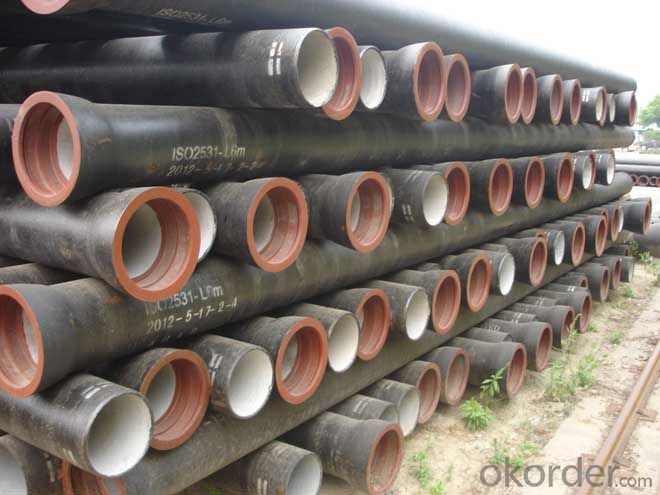
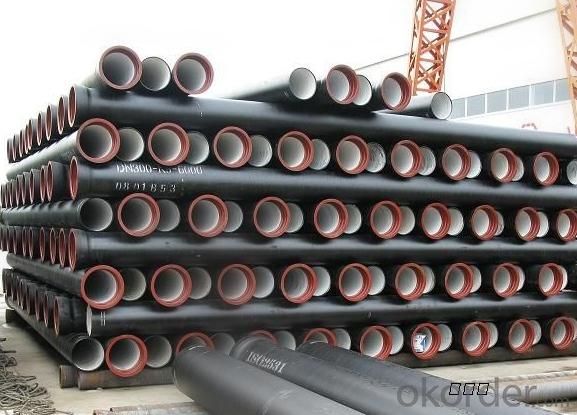
4. Ductile Iron Pipe Specification
Standard: API SPEC 5L 44th eidtion,ASTM A252-98(2007)
Grade: A53 Grades A/B, ASTM A106 Grades B/C,ASTM A179
AWWA, C200, ASTM A139, ASTM A120, API 5L Grade B
X42, X52, X56, X60, X65, X70, X80, X100
Weld Alternatives: LSAW
OD size range: 6.4~44.5mm
Wall thickness: 406.4~1422mm
Length: 3 - 12 m according to requirment
Note: Other grade can also be provided after consulting. Special design are available
for coal slurry conveyance LSAW line tube -- Service.
Place of Origin: China (Mainland)
Model Number: DN80-1600 Length: 6M/5.7M/NEGOTIATED Standard: ISO2531 / EN545
Application: Potable/Sewage Water
Diameter: DN80-1600
Shape: Round
Hardness: 230 Pipe
Wall Thickness: standerd
Pull Strength: 420
Yield (≥ MPa): 300
Material: Ductile Iron water ductile iron pipe: SO2531 / EN545 DI pipe
Packaging & Delivery
Delivery Detail: 30-45 days
Specifications
ductile iron pipe:
1. DN80-DN1600mm (T-Type, Class K9)
2.effective length 6m/pc
3.comply with ISO2531/EN545/EN598
5.FAQ:
We have organized several common questions for our clients,may help you sincerely:
1.Q: Why would you choose ductile iron pipe rather than other pipe materials?
A:The reasons are obvious for that not only ductile iron pipe possesses the inherent strength and flexibility of ductile iron, combined with proven corrosion protection systems, but also the cost savings can be achieved from design to installation and commissioning.
2.Q:Why can you guarantee the inner of pipes can’t be corroded?
A: High alumina cement mortar lining and sulphate-resistant cement mortar lining. These two special linings are applicable to inner anti-corrosion for sewage pipes, improving resistance to erosion of the sewage components.
- Q: Are ductile iron pipes suitable for irrigation systems in agricultural fields?
- Yes, ductile iron pipes are suitable for irrigation systems in agricultural fields. Ductile iron pipes have excellent strength, durability, and corrosion resistance, making them ideal for carrying water in irrigation systems. They can withstand high pressure and heavy loads, ensuring reliable water supply to agricultural fields for irrigation purposes.
- Q: Are ductile iron pipes suitable for installation in areas with high groundwater table?
- Indeed, areas with a high groundwater table are suitable for the installation of ductile iron pipes. These pipes are renowned for their exceptional strength and durability, rendering them perfect for underground installations. They possess the ability to endure the external pressure exerted by groundwater without any deformation or collapse. In addition, their outstanding resistance to corrosion shields them from the potentially harmful impact of groundwater. Consequently, ductile iron pipes can be confidently utilized in areas with a high groundwater table, ensuring the establishment of dependable and enduring water supply infrastructure.
- Q: Are ductile iron pipes suitable for road crossings?
- Yes, ductile iron pipes are suitable for road crossings. Ductile iron is a strong and durable material that can withstand heavy loads and traffic. It has high tensile strength and flexibility, making it an ideal choice for underground installations beneath roads. Additionally, ductile iron pipes are resistant to corrosion and have a long lifespan, making them a reliable option for road crossings.
- Q: What are the common methods for leak detection in ductile iron pipes?
- Professionals in the field commonly utilize various techniques to detect and locate leaks in ductile iron pipes. These methods play a crucial role in timely leak identification. 1. Acoustic Leak Detection: By employing specialized equipment, professionals listen for the sound of water escaping from the pipe. This equipment detects the leak's sound and aids in pinpointing its exact location. This technique is effective for both pressurized and non-pressurized pipes. 2. Visual Inspection: Physically inspecting the pipe system for visible signs of leaks, such as water stains, wet spots, or puddles, constitutes visual inspection. This relatively straightforward method proves effective in detecting visible leaks in accessible areas. 3. Pressure Testing: During installation or maintenance, pressure testing involves pressurizing the pipe system and monitoring pressure drops. A decrease in pressure signifies the presence of a leak. This method is particularly useful for identifying leaks in inaccessible areas. 4. Infrared Thermography: Infrared cameras detect leaks by measuring temperature variations. The camera can identify temperature differences caused by water escaping from a pipe. This technique is especially efficient in identifying concealed leaks behind walls or underground. 5. Tracer Gas Testing: Tracer gas testing entails injecting a specific gas, such as helium or hydrogen, into the pipe system. In the event of a leak, the gas escapes and can be detected using specialized equipment. This highly sensitive method can locate even minute leaks. 6. Soil Gas Monitoring: Monitoring the soil surrounding the pipe allows professionals to detect gases emitted by leaking water. Analyzing the composition of the soil gas aids in determining the leak's location. It is essential to consider the specific circumstances, such as pipe system size, accessibility, and leak severity when selecting a method. Combining multiple techniques may be necessary to ensure accurate and comprehensive leak detection.
- Q: Can ductile iron pipes be used for pressure reducing stations?
- Ductile iron pipes are indeed capable of being utilized in pressure reducing stations. Renowned for their robustness and resilience, these pipes are well-suited for managing applications involving high pressure. Their exceptional resistance to corrosion allows them to endure the mechanical pressures and strains typically associated with pressure reducing stations. Moreover, the smooth interior surface of ductile iron pipes minimizes friction losses and contributes to maintaining a consistent and regulated pressure within the system. Consequently, it can be concluded that ductile iron pipes are a dependable and frequently employed material in pressure reducing stations.
- Q: How do ductile iron pipes handle soil erosion?
- Ductile iron pipes are renowned for their exceptional strength and durability, rendering them highly resistant to the erosion of soil. The specific engineering of the material used in these pipes ensures their ability to withstand the detrimental effects of soil erosion, thereby guaranteeing long-lasting and dependable infrastructure. The composition of ductile iron pipes comprises a blend of iron, carbon, and other alloying elements, providing the necessary strength and resilience to withstand the forces exerted by soil erosion. These pipes possess a greater tensile strength than conventional cast iron pipes, enabling them to withstand pressure without deforming or cracking. Furthermore, ductile iron pipes boast a protective layer known as cement mortar lining, which acts as a barrier between the pipe and the surrounding soil. This lining offers an additional layer of resistance against corrosion and erosion caused by the chemical composition or abrasive particles present in the soil. Consequently, ductile iron pipes remain intact and continue to function effectively, even in areas experiencing high rates of soil erosion. In terms of installation, ductile iron pipes are specifically designed to be buried underground, ensuring their robust protection from direct contact with the soil. Additionally, their jointing systems are designed to provide secure and watertight connections, minimizing the risk of soil infiltration and subsequent erosion. Overall, ductile iron pipes have a proven track record of effectively combating soil erosion due to their superior strength, protective linings, and appropriate installation techniques. They offer a reliable and long-lasting solution for water and wastewater infrastructure, even in regions prone to soil erosion.
- Q: What are the different types of thrust restraints for ductile iron pipe?
- Ductile iron pipe installations utilize various thrust restraints to prevent pipe movement or separation caused by internal pressure, external loads, or temperature changes. 1. Concrete thrust blocks are structures installed at bends, tees, and directional changes in the pipeline. Their purpose is to transfer thrust forces to the surrounding soil or foundation, effectively resisting pipe movement. 2. Mechanical restraints, such as tie rods or harnesses, are steel-based devices that apply external force to restrain the pipe. They can be adjusted to accommodate changes in pipe length or alignment. 3. Pipe anchors, made of steel, are installed at intervals along the pipeline to provide resistance against axial movement. These anchors are embedded into the surrounding soil or concrete, securing the pipe firmly. 4. Thrust collars, typically made of steel, encircle the pipe to prevent movement or separation. They are strategically placed along the pipeline to absorb thrust forces. 5. Restrained joint systems are specialized pipe joints designed to resist axial forces. They possess additional features like keyways or wedges, enhancing resistance against movement. Selecting the appropriate thrust restraint system for ductile iron pipe installations depends on factors such as pipe diameter, operating pressure, soil conditions, and potential external loads. Consulting with qualified engineers or pipe manufacturers ensures the proper selection and installation of thrust restraints.
- Q: What is the expected sound transmission loss of ductile iron pipes?
- The expected sound transmission loss of ductile iron pipes can vary depending on various factors such as pipe thickness, diameter, and the surrounding environment. Generally, ductile iron pipes have good soundproofing properties due to their dense and heavy construction. They are typically designed to minimize noise transmission and vibration. In terms of sound transmission loss, ductile iron pipes can provide significant attenuation of noise. The material's inherent density and high mass make it effective in blocking sound waves and reducing their transmission. However, it is important to note that the sound transmission loss of ductile iron pipes may not be as high as other specialized soundproofing materials such as acoustic insulation or double-wall piping systems. To accurately determine the expected sound transmission loss of ductile iron pipes in a specific application, it is advisable to consult the manufacturer's specifications or conduct acoustic tests in accordance with relevant standards such as ASTM E90. These tests can provide precise data on the sound transmission loss values of ductile iron pipes under various conditions, helping to ensure proper noise control and acoustic performance in specific installations.
- Q: Can ductile iron pipes be used for irrigation of golf courses?
- Yes, ductile iron pipes can be used for irrigation of golf courses.
- Q: How long do ductile iron pipes last?
- Ductile iron pipes have a lifespan of about 100 years or even more, making them a highly durable and long-lasting choice for water and sewage systems.
Send your message to us
Ductile Iron Pipe of China DN300 ISO2531 On Sanitary
- Loading Port:
- China main port
- Payment Terms:
- TT or LC
- Min Order Qty:
- 20 m.t.
- Supply Capability:
- 100000 m.t./month
OKorder Service Pledge
OKorder Financial Service
Similar products
Hot products
Hot Searches
Related keywords
